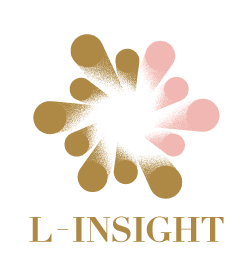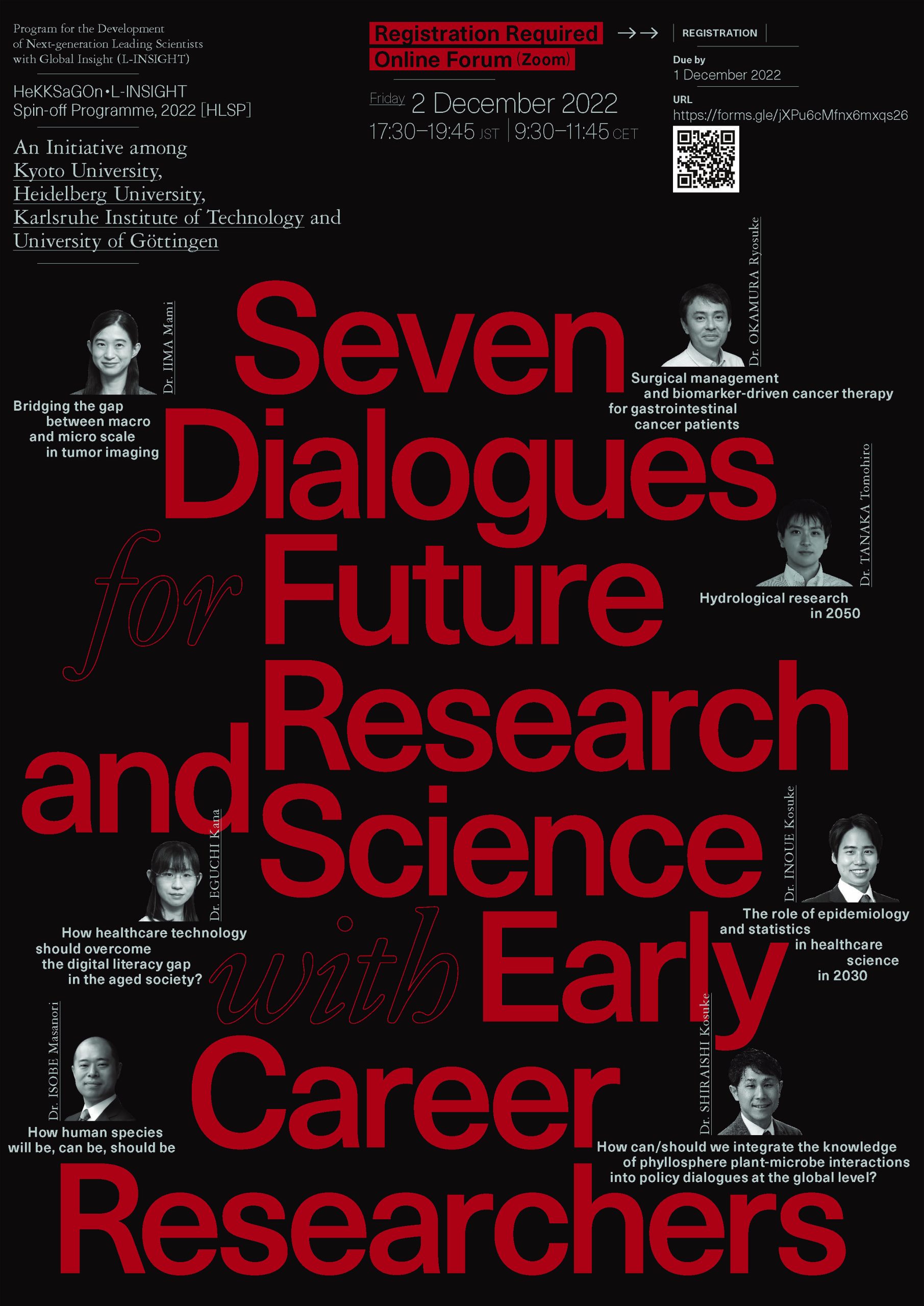【HeKKSaGOn・L-INSIGHT Spin-off Programme [HLSP]2022】“Seven Dialogues for Future Research and Science with Early Career Researchers”
This open online forum consists of several dialogues among researchers from Kyoto University (L-INSIGHT fellows, a community of early career researchers), Heidelberg University, Karlsruhe Institute of Technology and Göttingen University. Each group will discuss an interdisciplinary topic(s) raised by L-INSIGHT fellows.
We cordially invite you to the dialogues regarding the topics of your choice. Please join to find a new insight and create future connections through this opportunity.
L-INSIGHT fellows participating in the online forum and researchers affiliated with German universities can visit Germany/Kyoto with their students and collaborators after the forum or be invited to Kyoto/Germany.
*Click on image to download PDF
Outline
| Dates and time | 2 December 2022 17:30–19:45 JST|9:30–11:45 CET |
|---|---|
| Venue | Online Forum(Zoom) |
| Target | Researchers, undergraduate and graduate students, URAs, etc. interested in the dialogue theme |
| Entrance fee | Free |
| Language | This program will be held in English. Simultaneous interpretation will not be provided. |
| Registration | Registration Required https://forms.gle/jXPu6cMfnx6mxqs26 |
| Due Date | 1 December 2022 |
| Contact | Kyoto University Center for Enhancing Next-Generation Research admin-l-insight@mail2.adm.kyoto-u.ac.jp |
| Organizers | Kyoto University, Karlsruhe Institute of Technology and University of Göttingen |
| Collaborator | Kyoto University European Center |
Program
Opening remarks
-
Prof. YOKOYAMA Mika
Deputy Executive Vice-President, Director of Kyoto University European Center, Kyoto UniversityDr. Klaus Rümmele
Head of International Affairs Business Unit ,KIT
-
Dialogue1
Dr. OKAMURA Ryosuke【 L-INSIGHT fellow 】
Kyoto University Hospital / Assistant ProfessorDr. Johannes Betge (DKFZ)
Translational Gastrointestinal Oncology and Preclinical Models Junior Clinical Cooperation Unit
DKFZDr. Jörg Leupold
Department of Experimental Surgery, Cancer Metastasis, Heidelberg UniversityDr. Nitin Patil
Department of Experimental Surgery, Cancer Metastasis, Heidelberg UniversityProf. Dr. Anne-Christin Hauschild
Department of Medical Informatics University Medical Center Göttingen Göttingen University - Surgical management and biomarker-driven cancer therapy for gastrointestinal cancer patients
Background/Motivation:
Despite the recent development of surgical technology, we unfortunately see postoperative disease recurrence in many of advanced GI cancer cases. We surgeons should know the limits of surgical strategy for controlling tumor spread. How should current precision oncology, such as molecular profiling and biomarker-driven cancer therapy, be combined with surgery to improve GI cancer patients’ outcomes? -
Dialogue2
Dr. TANAKA Tomohiro【 L-INSIGHT fellow 】
L-INSIGHT fellow / Graduate School of Engineering, Kyoto University / Assistant ProfessorDr. Simon Schaub
Institute of Political Science, Heidelberg UniversityDr. Guyen Battuvshin
Institute of Geography, Heidelberg UniversityProf. Dr. Martin Sauter
Geoscience Centre University of Goettingen - Hydrological research in 2050
Background/Motivation:
Water sciences, such as hydrology, climatology, limnology, oceanology, coastal engineering, etc., pay the ever-strongest attention to climate change (CC) and its impact assessments. In 1990s and 2000s, CC research in hydrology was simply translating future projected rainfall to the resultant water cycle. Now, this topic became further more sophisticated, including more detailed hydraulic analysis such as inundation, landslides and their translation into economic impacts. The urgent needs of society for climate change adaptation accelerated such studies during this short period. In 2050, when climate change more explicitly emerges, how will or should our hydrological research, especially for CC assessments/adaptation/mitigation go? I would like to discuss the future of hydrology research: more social sciences associated, climate change validation, hydrological modelling, hydrological observation, etc. -
Dialogue3
Dr. INOUE Kosuke【 L-INSIGHT fellow 】
L-INSIGHT fellow / Graduate School of Medicine, Kyoto University / Assistant ProfessorPD Dr. Volker Winkler
Heidelberg Institute of Global Health, Epidemiology of Transition, Heidelberg University HospitalJunior-Prof. Dr. Tim Mathes
Department of Medical Statistics at the University Medical Center GöttingenPelin Ünal
Genomic Epidemiology Group
DKFZTomislav Vlaski
Division of Clinical Epidemiology and Aging Research
DKFZProfessor Dr. Tim Friede
“Head of Department of Medical Statistics
University Medical Center Göttingen” - The role of epidemiology and statistics in healthcare science in 2030
Background/Motivation:
Given the recent rapid advancement of computer science, big data, and machine learning as well as increasing concern over social disparity, what knowledge and skillsets would be appreciated in future science and medicine? What can we do to improve health towards precision medicine (in real meaning)? -
Dialogue4
Dr. SHIRAISHI Kosuke【 L-INSIGHT fellow 】
L-INSIGHT fellow / Graduate School of Agriculture, Kyoto University /Assistant ProfessorGideon Bergheim
Centre for Organismal Studies (COS) HeidelbergDr.Islam Khattab
Institute for Biological Interfaces, KITProf. Dr. Tobias Erb
Max Planck Institute for Terrestrial Microbiology, Marburg, Germany - How can/should we integrate the knowledge of phyllosphere plant-microbe interactions into policy dialogues at the global level?
Background/Motivation:
Plant-microbe interaction is a complex, dynamic and continuous process. It has been shown to support plant growth and increase host resistance to pathogens, and the rhizosphere, the underground part, has been the center of the research. Recently, the phyllosphere, the plant leaf surface, has attracted many scientists and phyllosphere microbes have been recognized as important players. New insights have been put into practical applications such as biostimulants for crop yield promotion and plant protection from pathogens. Looking at the accumulating evidence from the perspective of scientific advice for policy-making, the plant-microbe interaction of the rhizosphere has been discussed in international policy dialogues, whereas that of the phyllosphere is stuck in dialogues among researchers. Through some international expert communities, we have started to share new knowledge on phyllosphere microbiology with the expectation to bring the discussion to international policy dialogues for food security and environmental protection. -
Dialogue5
Dr. ISOBE Masanori【 L-INSIGHT fellow 】
L-INSIGHT fellow / Kyoto University Hospital / Assistant ProfessorDr. Jerome Foo
Dept. Genetic Epidemiology in Psychiatry, Central Institute of Mental Health, Medical Faculty Mannheim, Heidelberg UniversityKelly Amal Dhru, LL.M.
Hamburg UniversityKonrad Waschkies
Department of Psychiatry and Psychotherapy University of Göttingen - How human species will be, can be, should be
Background/Motivation:
Currently, various state-of-art technics to enhance intellectual ability, such as decoded neurofeedback, have been developed and are now close to be implemented in the clinical field. Careful discussion in advance would be desirable from multiple perspectives as follows; how far the expansion of physical and cognitive functions should go, how far it should be allowed to go, and what kind of common understanding and restrictions are necessary when this expansion proceeds. For example, restrictions have been placed on human cloning, but what extent do such restrictions need to be extended to enhancement of our physical/mental activities? What remains as our individuality? I would like to discuss these issues with people from various fields including those who specialize in bioethics, law, and those who are researching the improvement of cognitive function and recovery of physical function. -
Dialogue6
Dr. EGUCHI Kana【 L-INSIGHT fellow 】
L-INSIGHT fellow / Graduate School of Medicine, Kyoto University /Program-Specific Assistant ProfessorDr. Nicolai SPICHER
Department of Medical Informatics, Göttingen UniversityDr. Sebastian Herberger
Interdisciplinary Center of Sleep Medicine, Charité-Universitätsmedizin, Berlin - How healthcare technology should overcome the digital literacy gap in the aged society?
Background/Motivation:
Aging and health now become a worldwide problem. On the basis of WHO’s fact sheets [ref1], the proportion of the world’s population over 60 years will become 22%, while 80% of them will be living in low- or middle-income countries. These situations may cause an ever-greater digital literacy gap, which may even affect access to healthcare or medical service.
At this moment, our study has already faced the digital literacy gap-induced problems in collecting side-effect reports from patients undergoing cancer pharmacotherapy: we confirmed that the use of smartphone applications may become a big hurdle for aged Japanese people. In this dialogue, I would like to first exchange the current situation in Germany and Japan related to the issues surrounding healthcare induced by the digital literacy gap. Then discuss possible issues induced by the digital literacy gap in the future and how we can/should overcome the vicious circle of technology development and the digital literacy gap.
[ref1] https://www.who.int/news-room/fact-sheets/detail/ageing-and-health -
Dialogue7
Dr. IIMA Mami【 L-INSIGHT fellow 】
L-INSIGHT fellow / Kyoto University Hospital / Assistant ProfessorA/Prof. Dr. Dimitrios Karampinos
Experimental Magnetic Resonance Imaging School of Medicine & Munich Institute of Biomedical Engineering Technical University of MunichPD Dr. Sebastian Bickelhaupt
Institute for Radiology
University Hospital ErlangenDr. Felix Kurz
Division of Radiology
DKFZDr. Van Anh Tu
Experimental Magnetic Resonance Imaging, School of Medicine & Munich Institute of Biomedical Engineering, Technical University of Munich - Bridging the gap between macro and micro scale in tumor imaging
Background/Motivation:
We will aim to establish a trans-scale imaging method that connects a whole body, tissue, and cellular scales using MRI etc, especially diffusion MRI, which can evaluate the movement of water molecules in vivo. In the diagnosis of cancer, it is important to understand the phenomenon and elucidate the mechanism by traversing various scales, such as the tumor microenvironment and micrometastases that may exist throughout the body. However, the understanding of the principles that will lead to the elucidation of new pathological conditions at the microscopic level involving elemental interactions in biomolecules and cells, and at the meso- and macro-level involving tissues and organs, has not yet been fully developed.
The current MRI has difficulty in measuring and evaluating the micro level, especially in terms of resolution, and thus we will aim to develop this method further to establish trans-scale imaging to visualize cancer characteristics on a longitudinal scale and exploit them for cancer diagnosis and prognosis prediction.
General discussion
- Wrap-ups from each group(5min.×7groups)
- Comments from guests
Commentator
-
Prof. Dr. Thomas Kneib
Dean of research at the Faculty of Business and Economic Sciences, University of GoettingenProf. TANAKA Motomu
Institute for Physical Chemistry, Heidelberg UniversityProf. KONO Yasuyuki
Vice President, Director International Strategy Office, Kyoto UniversityDr. Michael Riemann
Botanical Institute, KIT
Closing
-
Nicole Dorn
International Relations Division, Department Study Abroad, Exchange Programmes, International CooperationProf. Akihiko Akamatsu
L-INSIGHT Program Manager, Kyoto University
Organizers
Heidelberg University
Karlsruhe Institute of Technology
University of Göttingen
Kyoto University

